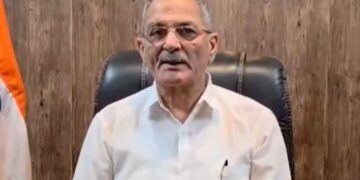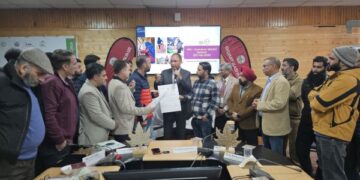Srinagar: The four-day workshop on “Engaging Students for Wetland Conservation,” focusing on the Khushalsar and Gilsar wetlands, was inaugurated today by the PG Department of Zoology at Islamia College, in collaboration with the Delivery & PMU, STS Global Company, and the Department of Ecology, Environment, and Remote Sensing (DEERS), Government of Jammu & Kashmir.
The event brought together students, faculty, and environmental experts to discuss the critical role of wetlands in preserving ecological balance.
The inaugural session was formally opened by Professor Tehmina Yousuf, Principal of Islamia College, who provided an overview of the wetlands in the Kashmir Valley. In her address, Professor Yousuf highlighted the workshop’s primary goal: to inspire students from diverse academic backgrounds to actively engage in environmental sustainability. She emphasized the college’s dedication to promoting environmental awareness and fostering sustainable practices, adding that this workshop is part of a larger initiative to involve the community in crucial ecological issues, particularly around the Khushalsar and Gilsar wetlands, which are situated near the college.
Chief guest Rafi Ahmad Bhat, Regional Director of DEERS, delivered a detailed presentation on the ecological significance of wetlands, with a special focus on Khushalsar and Gilsar. He underscored that these wetlands are not just ecosystems but essential lifelines, providing key services such as water filtration, flood control, and habitat for a wide range of species. Bhat elaborated on the ongoing Mission Ehsaas, which aims to rehabilitate the Khushalsar and Gilsar wetlands by rallying community support and fostering administrative cooperation. The mission has prioritized the cleaning of these wetlands to restore traditional navigation routes and improve water circulation.
Kh. Samuel Poumai, Senior Manager of Services Projects from STS Global Company, and Dr. Mahreen Khalil, Founder & Chairperson of the Wildlife Research & Conservation Foundation (WRCF), offered a global perspective on wetland conservation. They discussed sustainable practices and shared insights into how the Khushalsar and Gilsar wetlands can benefit from international conservation models. Poumai encouraged participants to contribute to local conservation efforts and spread awareness about the critical importance of these ecosystems.
Award-winning science filmmaker and Earth journalist, Jalal Ud Din Baba, praised the collaborative nature of the workshop, stating that such efforts offer valuable learning opportunities for students. He emphasized the vital role wetlands play in maintaining biodiversity and regulating climate.
The workshop, which spans four days, will include hands-on training, site visits, and report writing. During the technical sessions, led by Poumai and Dr. Mahreen, students learned about the habitats provided by Khushalsar and Gilsar for numerous species, including migratory birds. They also received insights into ongoing initiatives aimed at restoring habitats, managing pollution, and raising community awareness to promote sustainable practices. Experts highlighted how these wetlands serve as essential water sources for the local population, support diverse ecosystems, and contribute to the region’s cultural heritage.
The students actively participated in discussions, engaging with experts during Q&A sessions, demonstrating their enthusiasm for the conservation of these vital natural resources.





